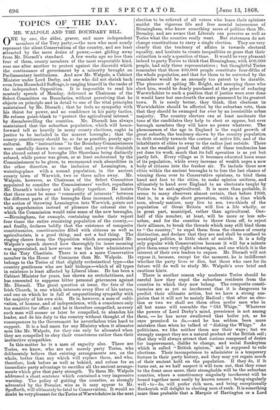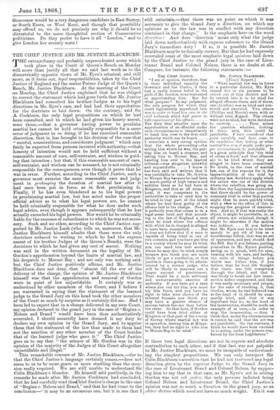TOPICS OF THE DAY.
MR. WALPOLE AND THE BOUNDARY BILL.
ONE by one, the abler, graver, and more independent members of the Tory party,—the men who most nearly represent the silent Conservatism of the country, and are least attracted by the mere desire of power,—are gliding away from Mr. Disraeli's standard. A few weeks ago no less than four of them, county members of the most respectable kind, rose one after another to protest against the discredit which the continuance of government by a minority brought on Parliamentary institutions. And now Mr. Walpole, a Cabinet Minister under Lord Derby, and one who did not shrink back even from Household Suffrage, is ranging himself hi the ranks of the independent Opposition. It is impossible to read his masterly speech of Monday, delivered as Chairman of the Select Committee on Boundaries, without perceiving that he objects on principle and in detail to one of the vital principles maintained by Mr. Disraeli ; that he feels no sympathy with his thirst for power, and no confidence in his party tactics. He refuses point-blank to "protect the agricultural interest" by disembowelling the counties. Mr. Disraeli has always maintained that the suburban population, which will hence- forward tell so heavily in many county elections, ought in justice to be included in the nearest boroughs ; that the county constituency should be, so far as possible, purely agri- cultural. His "instructions "to the Boundary Commissioners were carefully drawn to secure that end, power to diminish the absurd extent of boroughs like Shoreham being distinctly refused, while power was given, or at least understood by the Commissioners to be given, to recommend such absurdities in the other direction as the inclusion of Leamington, a watering-place with a nomad population, in the ancient county town of Warwick, two or three miles away. Mr. Walpole, however, as Chairman of the Select Committee appointed to consider the Commissioners' verdict, repudiates Mr. Disraeli's trickery and his policy together. He insists that there must be some "community of interests" between the different parts of the boroughs thus increased, ridicules the notion of throwing Leamington into Warwick, points out with apprehension instead of pleasure the colossal size to which the Commission would raise some of the new boroughs, —Birmingham, for example, containing under their report four times the entire remaining population of the county,— and finally, declares boldly that the existence of composite constituencies, constituencies filled with citizens as well as agriculturists, is a good thing, and not a bad thing. The ringing cheers from the Opposition which accompanied Mr. Walpole's speech showed how thoroughly its inner meaning was appreciated, and how severe was the blow administered to the Tory Chartists. There is not a more Conservative member in the House of Commons than Mr. Walpole. He belongs to the Tories of that slightly ecclesiastical type—the country gentlemen who are half bishops—which of all types in existence is least affected by Liberal ideas. He has been a Cabinet Minister for years, has shown no crotchettiness, and has consented to suppress bitter personal grievances against Mr. Disraeli. The great question at issue, the fate of the Irish Church, is one which interests every fibre of his nature, and one on which he is full of unquestioning sympathy with the majority of his own side. He is, however, a man of culti- vation, of honour, and of independence, with a conscience only too sensitive for office ; and he is therefore compelled, as every such man will sooner or later be compelled, to abandon his leader, and do his duty to the country without thought of the consequences to the Government he nevertheless tries hard to support. It is a bad omen for any Ministry when it alienates men like Mr. Walpole, for they can only be alienated when they are compelled to obey their consciences rather than their instinctive sympathies.
In this matter he is a man of sagacity also. There are Tories, we know, who are not merely party Tories, who deliberately believe that existing arrangements are, on the whole, better than any which will replace them, and who, therefore, look before as well as behind, and refuse for an immediate party advantage to sacrifice all the ancient arrange- ments which give that party strength. To them Mr. Walpole addressed a short sentence which contained a very impressive warning. The policy of gutting the counties, so strongly advocated by the Premier, wise as it may appear to Mr. Spofforth, will ultimatelybe fatal to Conservatism. It would no doubt be very pleasant for the Tories of Warwickshire in the next election to be relieved of all voters who learn their opinions amidst the vigorous life and free mental intercourse of Birmingham, who know something more of politics than Mr. Bromley, and are aware that Liberals can perceive as well as Tories what the counties really want. But statesmen do not change constitutions to carry a single election. They see very clearly that the tendency of affairs is towards electoral equality, and hesitate to create inequalities so gross that their extinction is only a question of time. It would be very pleasant • indeed to party Tories to think that Birmingham, with 400,000 people, had only three representatives ; but thoughtful Tories remember that those 400,000 people constitute four-fifths of the whole population, and that for them to be outvoted by the remainder would be an anomaly too patent to be durable. The pleasure of spiting Mr. Bright, and annoying those who elect him, would be dearly purchased at the price of reducing Warwickshire to such a position that if justice were ever done it would have but one-fourth the seats possessed by its greatest town. It is surely better, they think, that elections in Warwickshire should be affected by the suburban vote, than that they should be swamped for ever by an irresistible urban majority. The country electors can at least moderate the tone of the candidates they help to elect or oppose, but over borough members they will have no power whatever. The phenomenon of the age in England is the rapid growth of great suburbs, the tendency shown by the country population to drift steadily towards the centres of active life, and of the inhabitants of cities to sway to the radius just outside. There is not the smallest proof that either of these tendencies has yet done its work, much that its full operation is as yet but partly felt. Every village as it becomes educated loses some of its population, while every increase of wealth urges a new body of citizens into the fresher air. To include these new cities within the ancient boroughs is to lose the last chance of winning them over to Conservative opinions, to bind them. hand and foot to the cities, to make opinion uniform, and ultimately to hand over England to an electorate taught by Tories to be anti-agricultural. It is more than probable, it seems to many observers almost certain, that before 1900, that is, in a single short generation, within a time which men, already mature, may live to see, two-thirds of the population of Great Britain will live a life wholly, or in great part, municipal, rather than agricultural. One- half of this number, at least, will be more or less sub- urban, and for the counties to throw them off, to reject their alliance, to break the threads which may still bind them to "the country," to expel them from the chance of county distinction, and declare that they are and shall be confined to municipal politics, is little short of suicide. It is a folly only popular with Conservatives because it will for a minute give them some very slight advantages, and one which it is the interest of their own leaders to expose. Mr. Disraeli will not expose it, because, except for the moment, he is indifferent whether the party lives or dies, but those who care for its future will do well to study Mr. Walpole's over brief and cautious hints.
There is another reason why moderate Tories should be careful how they expel the suburban residents from the counties to which they now belong. The composite consti- tuencies are as yet so incoherent that it is dangerous to predict their ultimate action, but we have a strong sus- picion that it will not be mainly Radical ; that after an elec- tion or two we shall see them often prefer men who in all but name will resemble the "Old Whigs." Whatever the powers of Lord Derby's mind, prescience is not among them, — he has never swallowed that boiler yet, as he once promised to do,—and he has seldom been more mistaken than when he talked of "dishing the Whigs." As politicians, we like neither them nor their ways ; but we strongly suspect they are a natural product of the British soil; that they will always attract that curious compound of desire for improvement, dislike to change, and social flunkeyism which is called "British opinion," and is supposed to rule elections. Their incompetence to administer is a temporary feature in their party history, and they may yet regain much of their ancient hold on the population. If they do, if it turns out, as we half suspect it will turn out, that they come to the front once more, their strongholds will be the suburban counties, where a constituency singularly incoherent will be bound together most easily by known names ; being singularly well - to - do, will prefer rich men, and being exceptionally flunkeyish will delight in electing men of rank. It is something more than probable that a Marquis of Hartington or a Lord Grosvenor would be a very dangerous candidate in East Surrey, or South Essex, or West Kent, and though that possibility may offend us, we do not precisely see why it should be so distasteful to the more thoughtful section of Conservative politicians. Do they prefer to have it all "London," and to give London her seventy seats 11































 Previous page
Previous page